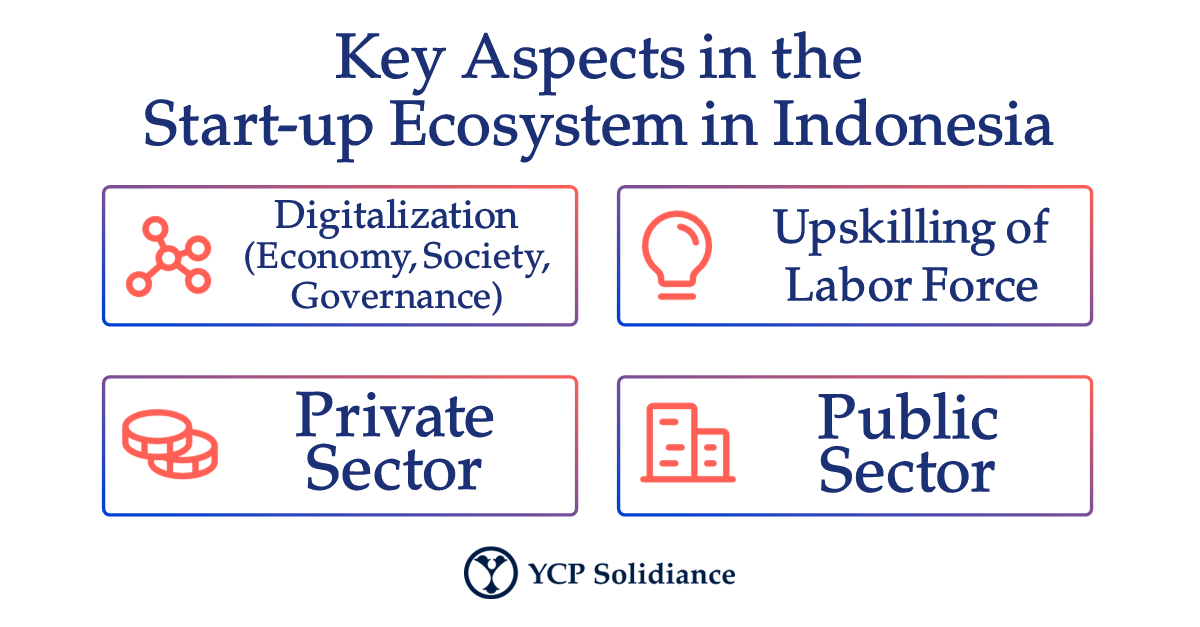According to a report by The Jakarta Post, the President of Indonesia urged state-owned enterprises (SOEs) and their venture capital arms to take on more active roles in aiding the growth of homegrown start-ups, which ultimately boosts the country’s digital economy.
Considering that recent digitalization efforts over the pandemic have accelerated the development of Indonesia’s internet economy and its local start-ups, the current challenge is creating an ecosystem that sustains such growth. In the long and short term, the outlook of start-up enterprises in Indonesia and their success will depend on several factors.

In terms of the number of start-ups present within a country, Indonesia currently ranks 38th worldwide and second in Southeast Asia (SEA) as per statistics from Start-Up Blink. A separate report by Mime Asia also states that there are currently over 2000 startups in Indonesia.
Meanwhile, according to a 2021 report on SEA conducted by technology industry players, Indonesia’s internet economy was worth an estimated 70 billion USD in terms of the gross merchandise value (GMV) generated in 2021. The same report approximated that Indonesia’s internet economy value would reach 146 billion USD by 2025, making it one of the most valuable and fastest growing in SEA.
Given the current strength and future potential of Indonesia’s digital economy, as well as the considerable number of start-ups currently present in the country, the ecosystem in Indonesia is primed for the development of local enterprises. But to ensure that these start-ups succeed and reach their full potential, Indonesia and interested parties will need to focus on holistic digital development in key areas like governance and society. By further developing these areas, Indonesia will bolster the growth of its digital economy and perhaps, more importantly, the transformation of start-ups into unicorn companies.
Transforming Start-ups into Unicorns
In a previous YCP Solidiance article about unicorn companies in Indonesia, one of the keys to fostering unicorn companies is ensuring the availability of talent, which may be achieved through upskilling workers wherein they become familiarized with digitalization basics. In this regard, workers who aim to eventually work in start-ups will have to equip themselves with skills in areas like cloud computing, artificial intelligence (AI), and the Internet of Things (IoT). Investing in digital upskilling not only ensures that start-ups have access to an adequate amount of manpower, but more importantly, it serves to develop the next generation of talent.
Cooperation between the private and public sectors will be essential to accelerate the upskilling of workers and create programs that are accessible to interested parties. For instance, the Indonesian government collaborated with 197 private sector partners to launch the Digital Talent Scholarship initiative– a program that aims to educate 600,000 talents a year for 15 years. Meanwhile, an AI-based recruitment platform, KUPU, partnered with the Indonesian government and 574 vocational schools to encourage students to participate in upskilling training sessions and recruitment programs. Currently, the platform has over one million users and a database of approximately 70,000 employers waiting to connect with these prospects.
As start-ups, the digital ecosystem, and the labor force’s skills mature in Indonesia, domestic and foreign investors will likely attempt to enter the market. Thus, local companies should expect an influx of investment, a development that will bolster their growth as start-ups. Stakeholders in Indonesia should capitalize on this as many will seek partnerships with pre-existing start-ups to accelerate growth as opposed to starting one from scratch. Moving forward, the outlook of start-ups in Indonesia is promising as many of the parties involved are taking proactive steps to aid local enterprises in the long and short term.
To get insight into digitalization trends related to the growth of SMEs in Asia, subscribe to our newsletter here and check out these reports:







